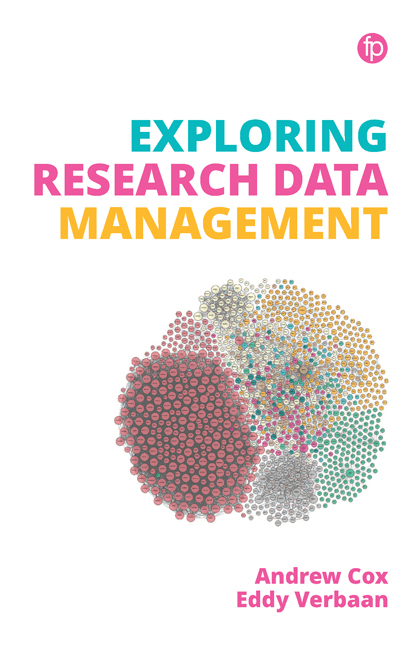Book contents
- Frontmatter
- Contents
- List of tables and figures
- 1 Introducing Research Data Management
- 2 The Social Worlds of Research
- 3 What Are Research Data?
- 4 Case Study of RDM in an Environmental Engineering Science Project
- 5 RDM: Drivers and Barriers
- 6 RDM as a Wicked Challenge
- 7 Research Data Services
- 8 Staffing a Research Data Service
- 9 Requirements Gathering for a Research Data Service
- 10 Institutional Policy and the Business Case for Research Data Services
- 11 Support and Advice for RDM
- 12 Practical Data Management
- 13 Data Management Planning
- 14 Advocacy for Data Management and Sharing
- 15 Training Researchers and Data Literacy
- 16 Infrastructure for Research Data Storage and Preservation
- 17 Evaluation of RDS
- 18 Ethics and Research Data Services
- 19 A Day in the Life Working in an RDS
- 20 Conclusion: the Skills and Mindset to Succeed in RDM
- Index
12 - Practical Data Management
Published online by Cambridge University Press: 21 September 2019
- Frontmatter
- Contents
- List of tables and figures
- 1 Introducing Research Data Management
- 2 The Social Worlds of Research
- 3 What Are Research Data?
- 4 Case Study of RDM in an Environmental Engineering Science Project
- 5 RDM: Drivers and Barriers
- 6 RDM as a Wicked Challenge
- 7 Research Data Services
- 8 Staffing a Research Data Service
- 9 Requirements Gathering for a Research Data Service
- 10 Institutional Policy and the Business Case for Research Data Services
- 11 Support and Advice for RDM
- 12 Practical Data Management
- 13 Data Management Planning
- 14 Advocacy for Data Management and Sharing
- 15 Training Researchers and Data Literacy
- 16 Infrastructure for Research Data Storage and Preservation
- 17 Evaluation of RDS
- 18 Ethics and Research Data Services
- 19 A Day in the Life Working in an RDS
- 20 Conclusion: the Skills and Mindset to Succeed in RDM
- Index
Summary
Aims
The aim of this chapter is to review the aspects of practical data management that have a bearing on RDM. It will help you think about the day-to-day data management issues researchers face as an important aspect of RDM.
Introduction
The issues dealt with in this chapter can be introduced by the story of the poster that was supposedly once seen in a university computer lab. The poster offered a reward to whoever had stolen a laptop. It did not ask for the return of the laptop or even all the data on it, just the files in a single folder called ‘thesis data’. The poster explained that the folder contained the student's only copy of the data for their PhD, and that if it is not recovered the student cannot complete their doctorate. Quite a large reward was offered, but it was negotiable. The student was willing to pay more for the files. The thief was welcome to keep the laptop. No questions would be asked of whoever claimed the reward. We don't know if anyone did claim the reward. Actually we don't know if the whole story is true. It could be. It reflects that if data is core to some research work, the loss of data is a critical area of risk.
Laptops get stolen or lost all the time. They are notoriously unreliable. Surely people know this and back up their data and document the backups? Actually, no, the evidence seems to be that people are quite bad about managing their ‘stuff’, even critical files: they are not necessarily good at managing risk in an intelligent way. Unexpected eventualities such as fires or natural disasters do happen, which can endanger valuable material such as research data. In a rapidly changing technical environment people can be unclear about the changing nature of the risks they are taking with digital material. For example, cloud storage seems like an easy solution to storing a lot of data. But of course there are security issues. The proliferation of cloud storage platforms itself can lead to losing track of data.
- Type
- Chapter
- Information
- Exploring Research Data Management , pp. 107 - 114Publisher: FacetPrint publication year: 2018

